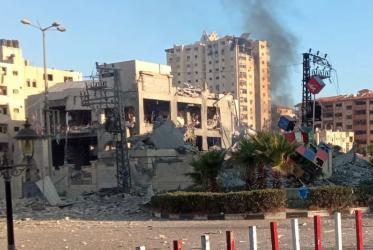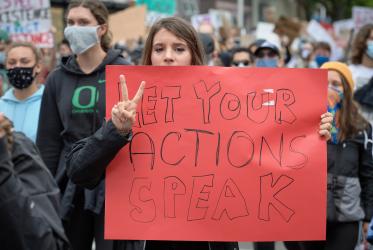Rassemblement des Eglises et Communautés Chrétiennes de Genève
Chapel of the Ecumenical Centre, Geneva, 19 January 2011
It is a joy, and it is also our duty, to come together to pray for the unity of the church. We are delighted to welcome the churches of Geneva to this service of worship and celebration in the chapel of the Ecumenical Centre.
There is an experience of fellowship which teaches us unity.
There is a humility in prayer which opens up the way for peace.
There is a simplicity in sharing which brings about reconciliation.
There is an openness in learning which brings about change.
There is a joy in breaking bread which brings about justice.
The churches in today's Jerusalem invite Christians throughout the world to read, reflect and pray on this challenging and beautiful passage from the Acts of the Apostles. I have had the honour of coming to know the churches of Jerusalem in our day, and heads of the churches of Jerusalem, including Bishop Munib Younan who serves as president of the Lutheran World Federation. In compelling and moving terms the Week of Prayer text for this year describes the original oneness of those early believers in Jesus. Being one means being together, breaking bread, praising God, but also giving and sharing, according to who is in need.
One striking image that comes through is that the apostles are together sharing around the table. That image of table sharing gives great spiritual energy to our ecumenical endeavours.
Yet as we read it today nearly 2000 years later this passage also challenges us. This is not an abstract philosophical text, nor one that can only have spiritual meaning.
It challenges us to reconsider how we witness to and live out our faith with generous hearts.
It calls our comfortable existence into question.
In a demonstration of what today we might call mutual accountability, the apostles sell their possessions and hold all things in common.
They break bread at the same table.
What does this say to us today about being one? About our unity?
In a month which has seen world food prices reach a new high, there is a longing for the simplicity and justice of such sharing - in our local communities and in our global village.
The injustice, the lack of "oneness" in the way the earth's fruits and resources are shared shame all of us.
For the first Christians, individual possessions were a block to being one. Our contexts today are of course very different, yet surely, as we seek the unity of Christianity and the unity of humanity, we also need to ask what do we need to let go of, to be one ...
What possessions, what power, what wealth but also what enmities, prejudices and hatreds do we need to let go of?
Perhaps as we consider how little we know even our fellow Christians of other traditions we also need to think about setting aside our ignorance and learning about and from each other as part of the essential learning and sharing we are called to.
These questions come into focus as the text reminds us very forcibly of how much the roots of our community are planted in Jerusalem. As a city it is the source and matrix of what the ecumenical movement needs to be. Here is the place of the crucifixion and the empty tomb. And there is such a wide variety of church traditions represented here. In a present-day context of despair and suffering, the churches of Jerusalem show determination and witness together with the global church for a just peace in the city of peace. When the churches in Jerusalem do this, they go beyond Christian confessional concerns and try to build the foundations of peace for neighbours of many faiths.
The global ecumenical fellowship of the World Council of Churches is committed to encouraging churches to work for a comprehensive just peace in the whole Middle Eastern region. As we pray together with the churches of Jerusalem this evening I would like to mention just two ways this is being expressed through our work.
As you leave the chapel this evening you will find information about the Ecumenical Accompaniment Programme in Palestine and Israel - created in 2002 in response to a call from the churches in Jerusalem – individual accompaniers from member churches live alongside Palestinians and Israelis and see what life is like. Afterwards they return to their own contexts and tell the story of what they have experienced. Some of my colleagues working in that area will be available to talk with you about that work.
In 2007 the World Council of Churches also launched the Palestine Israel Ecumenical Forum (PIEF) as a platform to promote prophetic witness for peace with justice and to prepare for reconciliation and healing processes in Palestine and Israel. This is an area of the Council’s work in which I was personally very involved before my election as general secretary.
In today's technologically linked culture, we are all observers of what happens in the Middle East, the challenges this poses to witnessing to the gospel today. The bombing of a Coptic Church in Alexandria has been a tragic reminder to global Christianity that, as the martyrs there were praying for peace in the middle of the night, we are called to vigilance, prayer and solidarity. It has also reminded us once more that we belong together, we are called to be one. It was deeply moving for me to be able to travel from Geneva to Cairo just 10 days ago to offer condolences to Pope Shenouda on behalf of the WCC, I was also privileged to be able personally to deliver to him a letter of solidarity and sympathy from the churches here in Geneva.
This Week of Prayer for Christian Unity calls us to learn from and with the Christians of Jerusalem. We do this with materials prepared by colleagues here in the house, working with colleagues in the Pontifical Council for Promoting Christian Unity as well as the people of the Jerusalem churches: we pray for peace and justice for all inhabitants of the Land we call Holy.
Yet if the Acts text challenges us deeply, it also encourages us to find ways forwards for our own witness and sharing. It is the promise and reality of Christ’s resurrection which give the impetus to the deep sharing and fellowship which the first Christians put into practice in the Acts.
We are called to continue to live out those resurrection values and that fellowship in our own contexts. Perhaps the image of the table can help us with this, it is around the table that not only bread is broken but that the word is shared; the table is a place of fellowship, of joy, a place for learning and forging reconciliation. The table is also a place and space that demands that we think about justice and the way food and access to power are shared in the world, especially at a time when speculation with food prices will mean that the poorest will become poorer, and go hungry.
Of course there is still sadly one table where we as Christians do not yet eat together. We live with the painful reality of our own divisions.
Yet here too the witness of Christians in Jerusalem, the mother church of us all, can help us. They show us that it is possible to work together despite divisions, to carry forward prophetic calls for justice and peace, and try to be one in action together. In 2011, this new year that has just begun, Christians of East and West will once again celebrate Easter on the same date – something we don’t do again until 2017.
During that special Easter time that we will share together this year I would like to invite you to consider inviting one another to simple Eastertide meals across confessional boundaries.
A way of celebrating that we are called to be one, and that we are one - offering each other a foretaste of God's kingdom of justice and joy. Maybe these meals could even be for the whole community where we live? Around the table we get to know one another differently, we talk, we learn, we laugh, we are in fellowship … and we break bread together.
Meanwhile, as we continue on our way, let us do what we are called to do: let us devote ourselves to the apostles’ teaching and fellowship, to the breaking of bread and to prayers.
There is a simplicity in sharing which brings about reconciliation
There is a joy in breaking bread which brings about justice
There is an openness in learning which brings about change
There is a humility in prayer which opens up the way for peace
There is an experience of fellowship which teaches us unity.
So, dear brothers and sisters:
May we be impelled by the Spirit to be one as we bear witness in today’s world and work with joy for justice, for change, for peace and for unity. Amen.




